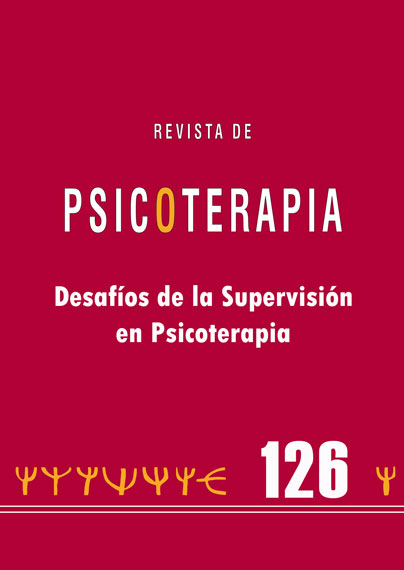The therapist-patient relationship as a critical element in cognitive behavioral therapy.
DOI:
https://doi.org/10.5944/rdp.v34i126.38036Keywords:
cognitive behavioral therapy, therapeutic relationship, therapeutic alliance, necessary conditions of therapyAbstract
Cognitive Behavioral Therapy has proven to be effective in the treatment of various psychopathologies and emotional and relationship problems, as well as an adjuvant in the medical treatment of diseases and pain management (Beck, 2021, Cuijpers et al., 2019, Hoffman et al., 2012). His cognitive, emotional, and behavioral interventions offer a clear and structured proposal to work with patients in a framework of learning and collaboration. Its effectiveness lies not only in the implementation of said interventions but also in the development of the therapeutic relationship that allows the expression of beliefs, emotions, and behaviors associated with the condition or reason for consultation of the patients, and that is essential in the process. of change and development of the patient (Beck et al., 1979). This text presents elements of the therapeutic relationship that research and various authors have indicated as necessary for the proper therapist-patient relationship and the achievement of therapeutic success.
Downloads
References
American Psychological Association. (2017). Ethical principles of psychologists and code of conduct (2002, amended effective June 1, 2010, and January 1, 2017) [Principios éticos de los psicólogos y código de conducta]. https://www.apa.org/ethics/code/index.aspx
Beck Institute. (2022). Cognitive Therapy Rating Scale – Revised [Escala de calificación de terapia cognitiva: revisada] (CTRS-R). https://beckinstitute.org/cbt-resources/resources-for-professionals-and-students/cognitive-therapy-rating-scale-revised-ctrs-r/
Beck, A., Rush, A. J., Shaw, B. F. y Emery, G. (1979). Cognitive therapy of depression [Terapia cognitiva de la depresión]. The Guildford Press
Beck, S. J. (2017). Foreword [Prefacio]. En N. Kazantzis, F. M. Dattilio y K. S. Dobson (Eds.), The therapeutic relationship in cognitive-behavioral therapy: a clinician´s guide. (pp. ix-xi) The Guildford Press.
Beck, S. J. (2021). Cognitive behavior therapy: basics and beyond [Terapia cognitivo-conductual: conceptos básicos y más allá] (3ª ed.). The Guilford Press.
Bennet-Levy, j., Thwaithes, R., Haarhof, B., Perry, H. y Castell Giménez, M (2018). Experimentar la TCC desde dentro. Manual de autopráctica/autorreflexión para terapeutas. Desclée De Brouwer
Cuijpers, P., Noma, H., Karyotaki, E., Cipriani, A. y Furukawa, T. A. (2019). effectiveness and acceptability of cognitive behavior therapy delivery formats in adults with depression: a network meta-analysis [Efectividad y aceptabilidad de los formatos de administración de la terapia cognitivo-conductual en adultos con depresión: un metanálisis en red]. JAMA Psychiatry, 76(7),700–707. https://doi.org/10.1001/jamapsychiatry.2019.0268
Guzmán-Sescosse, M. (2020). La transformación del adolescente: Guía para padres y profesionistas de adolescentes (2ª Ed.). Seeds Family Services
Guzmán-Sescosse, M. (10 enero, 2023). Introduction to cognitive behavioral therapy [Introducción a la terapia cognitive conductual]. Psychology Department. Trinity Christian College. Palos Heights, Il. United States
Hofmann, S. G., Asnaani, A., Vonk, J. J., Sawyer, A. T. y Fang, A. (2012). The efficacy of cognitive behavioral therapy: a review of meta-analyses. Cognitive Therapy and Research, 36(5), 426-440. https://doi.org/10.1007/s10608-012-9476-1
Hutcheson, C. L. (2019). Cognitive behavioral family therapy [Terapia familiar cognitivo conductual]. En L. Metcalf (Ed.), Marriage and family therapy: A practice-oriented approach (pp. 95–118).
Jongsma, A. E., Peterson, L. M. y Bruce, T. J. (2014). The complete adult psychotherapy treatment planner [El planificador completo de tratamientos de psicoterapia para adultos] (6ª ed.). John Wiley & Sons.
Kazantzis, N., Dattilio, F. M. y Dobson, K. S. (2017). The therapeutic relationship in cognitive-behavioral therapy: A clinician´s guide [La relación terapéutica en la terapia cognitivo-conductual: una guía para el clínico]. The Guildford Press
Lan, J. y Sher, T.G. (2019). Cognitive-behavioral family therapy [Terapia familiar cognitivo-conductual]. En J. L. Lebow, A. L. Chambers y D. C. Breunlin (Eds), Encyclopedia of couple and family therapy (pp. 497–505). Springer; Cham. https://doi.org/10.1007/978-3-319-49425-8_40
Leahy, R. (2008). The therapeutic relationship in cognitive-behavioral therapy [La relación terapéutica en la terapia cognitivo-conductual]. Behavioural and Cognitive Psychotherapy, 36(6), 769-777. https://doi.org/10.1017/S1352465808004852
Lobban, F. y Barrowclough, C. (2016). An interpersonal CBT framework for involving relatives in interventions for psychosis: evidence base and clinical implications [Un marco de TCC interpersonal para involucrar a familiares en intervenciones para la psicosis: base de evidencia e implicaciones clínicas]. Cognitive Therapy and Research, 40, 198–215. https://doi.org/10.1007/s10608-015-9731-3
Moorey, S. y Lavender, A. (2019). The foundations of the therapeutic relationship: therapist characteristics and change [Los fundamentos de la relación terapéutica: características del terapeuta y cambio]. SAGE Publications Ltd, https://doi.org/10.4135/9781526461568
Newman, C. F. y Kaplan, D. A. (2016). Essential dimensions/key principles [Dimensiones esenciales/principios clave]. En C. F. Newman & D. A. Kaplan (Eds.), Supervision essentials for cognitive-behavioral therapy (pp. 15–40). American Psychological Association. https://doi.org/10.1037/14950-002
Norcross, J. C. y Lambert, M. J. (2011). Psychotherapy relationships that work II [Relaciones de psicoterapia que funcionan]. Psychotherapy, 48(1), 4–8. https://doi.org/10.1037/a0022180
Psychology Today (21 junio, 2022). Trauma-focused cognitive behavior therapy [Terapia cognitivo-conductual centrada en el trauma] https://www.psychologytoday.com/us/therapy-types/trauma-focused-cognitive-behavior-therapy
Rogers, C. R. (1957). The necessary and sufficient conditions of therapeutic personality change [Las condiciones necesarias y suficientes del cambio terapéutico de la personalidad]. Journal of Consulting Psychology, 21(2), 95–103. https://doi.org/10.1037/h0045357
Tan, S. y Johnson, E. (15 abril, 2014). Can psychology be Christian? CCT Conversations // Eric Johnson & Siang-Yang Tan [Video]. YouTube. https://www.youtube.com/watch?v=bHFW_tOkaA4
Young, J. E., Klosko, J. S. y Weishaar, M. (2003). Schema therapy: a practitioner’s guide [Terapia de esquemas: una guía para el profesional]. The Guilford Press.
Downloads
Published
How to Cite
Issue
Section
License
Authors who publish in this journal accept the following conditions:
-
Authors retain copyright and grant the journal the right of first publication, with the work registered under the Creative Commons CC-BY-NC 4.0 International license. This license allows third parties to cite the text and use it without alteration and for non-commercial purposes, provided they credit the authorship of the work and its first publication in this journal.
-
Authors may enter into other independent and additional contractual agreements for the non-exclusive distribution of the version of the article published in this journal (e.g., including it in an institutional repository or publishing it in a book), provided they clearly indicate that the work was first published in this journal.
-
The views expressed in the articles are solely the responsibility of the authors and in no case do they reflect the opinions or scientific policies of the journal.















